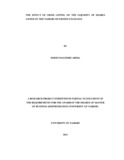| dc.description.abstract | For a company that is already listed on an exchange, an alternative route is to cross
list. Cross listing is where a firm lists its shares for trading on at least two stock
exchanges located in different countries. Listing of a company's equity in foreign
markets brings the opportunity to enhance corporate image, advertise trademarks and
products, get better local press coverage, and become more familiar with the local
financial community in order to raise working capital locally, establish a secondary
market for shares used to acquire other firms in the host markets. The purpose of this
study was to establish the effect of cross listing on liquidity.
The study adopted a descriptive research design and secondary data was collected for
4 Kenyan companies that are cross listed in other security exchange markets in East
Africa. Regression and correlation analysis were used to establish the effect in terms
of nature and magnitude.
The findings from the study indicated that cross listing explains 62.2% of the variance
on share liquidity among the cross listed companies in Kenya. It was also clear that
there exists a moderate positive correlation between the price of cross listed shares
and the volume of the share that are traded at the securities market. | en_US |

